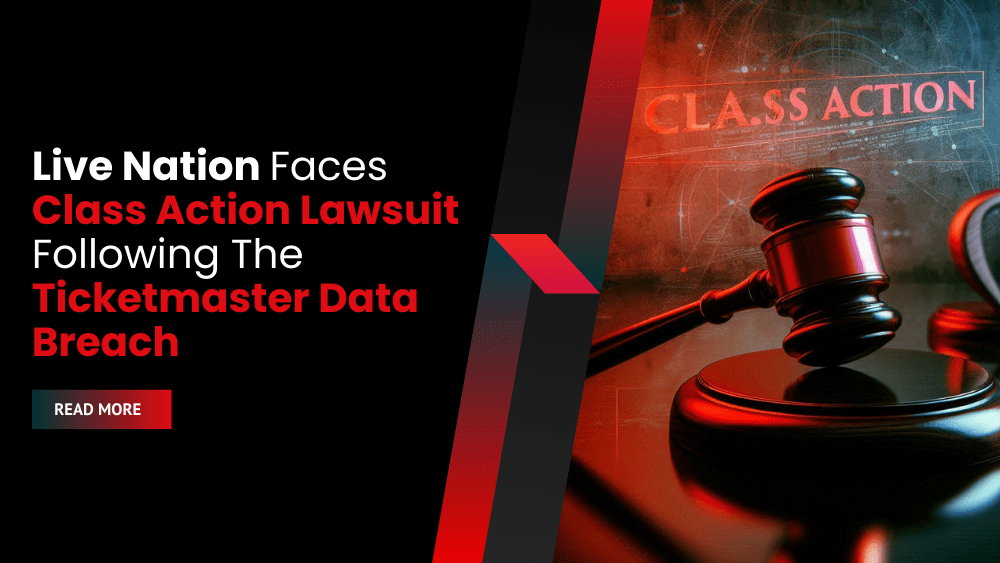In April 2024, the cybersecurity landscape was rocked by a significant data breach targeting Ticketmaster, a subsidiary of Live Nation Entertainment. The hacking group ShinyHunters claimed responsibility, revealing they had accessed Ticketmaster’s database and exfiltrated a staggering amount of sensitive user data. The breach compromised the full names, addresses, email addresses, phone numbers, and credit card information of up to 560 million customers. This massive data leak represents a significant violation of user privacy and trust.
The fact that it took Ticketmaster nearly two months to discover the breach and four months to notify affected users further highlights the severity of the situation and the potential for long-term consequences for millions of individuals.
The Lawsuit: Allegations of Negligence and Inadequate Security
The fallout from the Ticketmaster data breach has led to a proposed class-action lawsuit filed in California federal court. The lawsuit, filed on Friday, directly accuses Ticketmaster of negligence, claiming the company failed to implement adequate security measures to prevent the hack, promptly alert users to the data compromise, and ensure its cloud computing vendor, Snowflake (though not named in the complaint), maintained sufficient data security practices.
The plaintiffs are seeking unspecified damages of at least $5 million on behalf of the millions of affected users. The suit alleges that Ticketmaster’s failure to protect user data resulted in increased risks of identity theft, fraud, and spam for those impacted.
The lawsuit highlights several key areas of alleged negligence:
- Inadequate Vendor Management: The plaintiffs argue that Ticketmaster failed to properly manage its relationship with its cloud computing vendor, neglecting to ensure the vendor implemented appropriate security measures to safeguard user data. This highlights the critical importance of robust vendor risk management programs for organizations handling sensitive personal information. The lawsuit emphasizes that cybersecurity attacks are a known risk, and Ticketmaster’s failure to adequately address this risk left user data vulnerable.
- Retention of Unnecessary Data: The lawsuit also criticizes Ticketmaster for retaining personal information that it should have deleted. The complaint points out that Ticketmaster sells user data—including names, addresses, phone numbers, emails, IP addresses, transaction details, and preferences—to business partners and data brokers. This practice raises concerns about data privacy and the potential misuse of sensitive information.
- Delayed Notification: The significant delay in notifying affected users about the breach is another major point of contention. The lawsuit argues that this delay exacerbated the potential harm to users, allowing more time for malicious actors to exploit the stolen data.
The Broader Context: A Wave of Cyberattacks and the Rising Value of Stolen Data
The Ticketmaster hack is not an isolated incident. It forms part of a broader trend of cyberattacks targeting media and telecom companies in 2024, including high-profile victims such as Disney, Roku, and AT&T. ShinyHunters, the group responsible for the Ticketmaster breach, also targeted these other companies, demonstrating a pattern of large-scale data theft. The group even demanded a $500,000 ransom to prevent the resale of the stolen data on the dark web.
The lawsuit underscores the escalating value of stolen personal data in the age of sophisticated cybercrime. Stolen information can be used to create “Fullz” packages, comprehensive dossiers on individuals that can be used for various fraudulent activities, including obtaining fake driver’s licenses and loans. The increasing sophistication of cybercriminal techniques, including deepfake technology and AI-powered password cracking, further amplifies the risk and potential financial harm to individuals. The lawsuit points out that some categories of sensitive personal information can sell for as much as $360 per record, highlighting the lucrative nature of this type of crime.
Live Nation’s Response and the Ongoing Legal Battle
At the time of the article’s publication, Ticketmaster had not responded to requests for comment. The lawsuit adds another layer of complexity to Live Nation’s existing legal challenges, as the April hack preceded the Justice Department filing an antitrust lawsuit against the company. The outcome of this class-action lawsuit will have significant implications for Live Nation, Ticketmaster, and the broader entertainment industry, potentially setting precedents for data security practices and legal accountability for data breaches. The case underscores the need for companies to prioritize robust cybersecurity measures and responsible data handling to protect their customers and maintain public trust.









